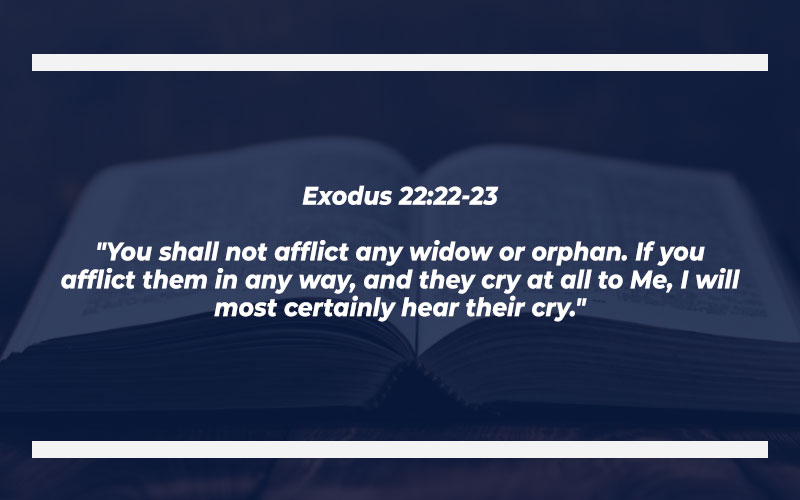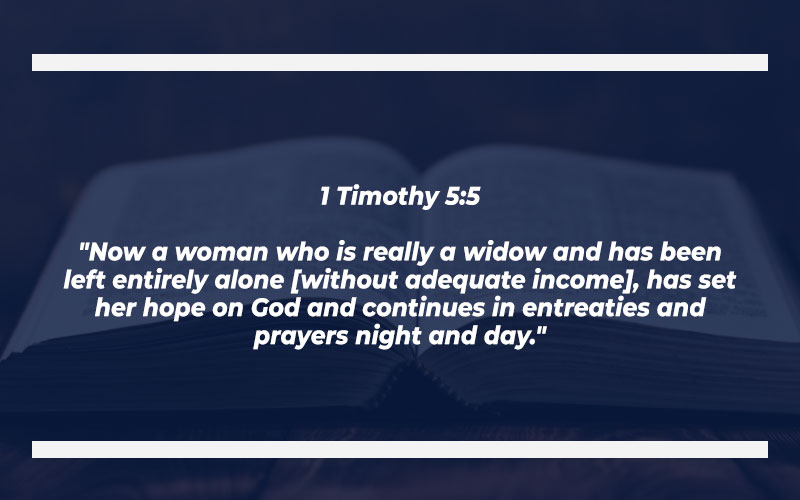The Bible consistently emphasizes the importance of caring for the vulnerable, including widows. Widows, often among the most marginalized in ancient societies, are highlighted in Scripture as deserving of particular attention and protection.
God’s heart for widows reflects His deep concern for justice and mercy.
Below are verses that highlight the biblical perspective on widows, accompanied by commentaries to help us understand the significance of these passages in both ancient and contemporary contexts.
Also Checkout: Bible Verses About Miscarriage
Bible Verses About Widows
Exodus 22:22-23
“You shall not afflict any widow or orphan. If you afflict them in any way, and they cry at all to Me, I will most certainly hear their cry.”

Commentary: This verse demonstrates God’s protective nature toward the vulnerable. The command is clear: widows and orphans are not to be mistreated. The warning is equally stark, indicating that God Himself will respond to the cries of those who suffer injustice. This underscores the seriousness with which God views the care of widows, calling believers to a high standard of compassion and justice.
Deuteronomy 10:18
“He executes justice for the orphan and the widow, and shows His love for the stranger (resident alien, foreigner) by giving him food and clothing.”
Commentary: In this passage, God is portrayed as a just and loving provider, especially for those in vulnerable positions such as orphans, widows, and foreigners. The verse calls believers to emulate God’s compassion and generosity by ensuring justice and provision for these groups.
Deuteronomy 14:29
“The Levite, because he has no portion or inheritance among you, and the stranger, the orphan, and the widow who are within your city gates, shall come and eat and be satisfied, so that the Lord your God may bless you in all the work of your hands.”
Commentary: This verse emphasizes the communal responsibility to care for those who have no means of support, including widows. The act of sharing resources is linked to God’s blessing, reinforcing the idea that provision for the vulnerable is not just a moral duty but also a pathway to divine favor.
Deuteronomy 24:17
“You shall not pervert the justice due to the stranger or the orphan, nor take a widow’s garment in pledge.”
Commentary: The command here is against exploiting the vulnerable. Taking a widow’s garment as a pledge would have left her even more destitute. This verse highlights the importance of justice and fairness, ensuring that those already in difficult situations are not further disadvantaged.
Deuteronomy 27:19
“Cursed is he who distorts the justice due a stranger, an orphan, or a widow. And all the people shall say, ‘Amen.'”
Commentary: This verse carries a strong warning against injustice toward the vulnerable, specifically widows, orphans, and strangers. The communal response of “Amen” indicates collective responsibility and agreement with God’s standards of justice. It serves as a reminder that mistreatment of the powerless is not only a personal failing but a societal one as well.
Job 29:13
“The blessing of him who was about to perish came upon me, and I made the widow’s heart sing for joy.”
Commentary: In this verse, Job reflects on his righteousness, specifically how he brought joy to the hearts of widows. His care for them is presented as a hallmark of his integrity. This passage challenges believers to consider how their actions impact the lives of those in need, particularly widows, and to strive to bring joy and relief to their circumstances.
Psalm 68:5
“A father of the fatherless and a judge and protector of the widows, Is God in His holy habitation.”
Commentary: This Psalm portrays God as the ultimate protector and judge for those who are most vulnerable, including widows. It offers comfort to those in distress, assuring them of God’s watchful care and justice. For believers, it serves as a call to mirror God’s concern by actively supporting widows and other vulnerable individuals.
Psalm 146:9
“The Lord protects the strangers; He supports the fatherless and the widow. He makes crooked the way of the wicked.”
Commentary: This verse highlights God’s active role in supporting and protecting the vulnerable, including widows. It also contrasts God’s justice with the ways of the wicked, reminding believers that God stands against those who would harm or exploit the powerless. It calls for trust in God’s justice and a commitment to support those in need.
Proverbs 15:25
“The Lord will tear down the house of the proud and arrogant (self-righteous), But He will establish and protect the boundaries of the [land of the] [godly] widow.”
Commentary: This proverb underscores the contrast between the proud and the humble. While the proud and self-righteous face destruction, God promises to protect and secure the property and rights of widows. This passage reinforces the idea that God’s justice is on the side of the humble and vulnerable.
Isaiah 1:17
“Learn to do good; Seek justice, Rebuke the ruthless, Defend the fatherless, Plead for the [rights of the] widow [in court].”
Commentary: This verse is a call to action, urging believers to actively pursue justice and righteousness. Defending the rights of widows is highlighted as a key aspect of this pursuit. The command to “plead for the widow” implies a legal and moral responsibility to ensure that widows receive fair treatment and protection in society.
Jeremiah 7:6
“If you do not oppress the stranger [immigrant], the orphan, or the widow, and do not shed innocent blood [by oppression and by judicial murders] in this place, nor walk after other gods to your own ruin.”
Commentary: This verse forms part of a conditional promise, linking the treatment of widows, orphans, and strangers with the well-being of the nation. Oppression and injustice toward these groups are presented as pathways to ruin, while righteous behavior is implied to lead to prosperity and divine favor.
Jeremiah 22:3
“Thus says the Lord, ‘Do justice and righteousness, and rescue the one who has been robbed from the hand of his oppressor. And do not mistreat or do violence to the stranger, the orphan, or the widow; and do not shed innocent blood in this place.”
Commentary: This verse reinforces the biblical mandate for justice and righteousness, particularly toward the vulnerable. God’s command to protect widows from mistreatment and violence highlights the seriousness with which He regards their well-being. Believers are called to actively defend the oppressed, reflecting God’s justice in their actions.
Ezekiel 22:7
“In you they have treated father and mother with contempt; in you they have oppressed the stranger and have mistreated the fatherless and the widow.”
Commentary: In this verse, the mistreatment of widows is listed among the sins that have brought judgment upon the people. It illustrates how the disregard for the vulnerable, including widows, is seen as a significant moral failing. This passage challenges believers to examine their own actions and attitudes toward those in need, ensuring they align with God’s standards of justice and compassion.
Zechariah 7:10
“And do not oppress or exploit the widow or the orphan, the stranger or the poor, and do not devise or even imagine evil in your hearts against one another.”
Commentary: This verse is a direct command against oppression and exploitation of vulnerable groups, including widows. It also warns against harboring evil thoughts toward others, emphasizing the importance of both outward actions and inward attitudes. Believers are called to cultivate hearts of compassion and justice, reflecting God’s character in their treatment of others.
Malachi 3:5
“Then I will come near you for judgment; I will be a swift witness against the sorcerers, against the adulterers, against those who swear falsely, against those who oppress the laborer in his wages, the widow and the orphan, and those who turn away the stranger from [his] right and do not fear Me,” says the Lord of hosts.”
Commentary: This verse presents a sobering warning of judgment against those who commit various sins, including the oppression of widows. It emphasizes that God is a witness to all injustice and will act accordingly. For believers, it serves as a reminder of the seriousness with which God views the treatment of the vulnerable, and the importance of living in a way that honors His commands.
Also Checkout: Bible Verses About Discouragement
Matthew 23:14
“Woe to you, scribes and Pharisees, hypocrites, because you swallow up widows’ houses and for a pretense you make long prayers; therefore you will receive the greater condemnation.”
Commentary: Jesus condemns the religious leaders of His day for their hypocrisy, particularly their exploitation of widows. This verse highlights the grave sin of using one’s position of power to take advantage of the vulnerable, especially under the guise of piety. It calls believers to examine their own motives and actions, ensuring they are characterized by genuine compassion and integrity.
Mark 12:40
“They [who] devour widows’ houses and in pretense offer long prayers. These will receive greater condemnation.”
Commentary: Similar to the verse in Matthew, this passage underscores the severity of exploiting widows while pretending to be righteous. Jesus’ words are a stark warning against using religious pretense to justify unjust actions. Believers are reminded to be vigilant against hypocrisy, especially in their treatment of those who are vulnerable.
Luke 2:37
“And then as a widow to the age of eighty-four she did not leave the [area of the] temple, but was serving and worshiping night and day with fastings and prayers.”
Commentary: This verse describes Anna, a devout widow who dedicated her life to worship and prayer. Her example highlights the potential for widows to play a significant role in the spiritual life of the community. It challenges believers to honor and support widows in their faith journeys, recognizing the value of their contributions.
Luke 7:12-13
“Now as He approached the gate of the city [Nain], a dead man was being carried out, the only son of his mother, and she was a widow; and a large crowd from the city was with her. When the Lord saw her, He felt [great] compassion for her, and said to her, ‘Do not weep.'”
Commentary: In this passage, Jesus’ compassion for a grieving widow is vividly displayed. By raising her son from the dead, He not only restored her family but also her means of support. This miracle underscores God’s deep concern for the emotional and material well-being of widows, inviting believers to similarly act with compassion and support for those in need.
Luke 18:3
“There was a [desperate] widow in that city, and she kept coming to him and saying, ‘Give me justice and legal protection from my adversary.'”
Commentary: This verse introduces the parable of the persistent widow, who relentlessly seeks justice from an unjust judge. Her determination serves as a powerful example of faith and perseverance, particularly for those who feel powerless. The passage encourages believers to persist in prayer and action, trusting that God will ultimately bring justice for the oppressed.
Luke 21:3-4
“And He said, ‘Truly I say to you, this poor widow has put in [proportionally] more than all of them; for they all contributed to the offering from their abundance; but she, out of her poverty, put in all she had to live on.'”
Commentary: In this verse, Jesus commends the widow who gives all she has to the temple treasury. Her sacrifice, though small in amount, is great in significance because it reflects her complete trust in God. This passage challenges believers to consider the depth of their own generosity and to give not just from surplus but with faith and commitment.
Acts 6:1
“Now about this time, when the number of disciples was increasing, a complaint was made by the Hellenists (Greek-speaking Jews) against the native Hebrews because their widows were being overlooked in the daily serving of food.”
Commentary: This verse reveals the early church’s commitment to caring for widows, highlighting the importance of fairness and inclusion. The complaint about overlooked widows led to the establishment of the diaconate, a ministry focused on service and care. This passage emphasizes the church’s responsibility to ensure that all members, especially the vulnerable, are cared for and valued.
1 Timothy 5:3
“Honor and help those widows who are truly widowed [alone, and without support].”
Commentary: This verse instructs the church to provide for widows who are truly in need, emphasizing the importance of discernment and care. The command to “honor” widows reflects not just material support but also respect and dignity. It challenges believers to be attentive to the needs of widows in their community, ensuring they receive the help and honor they deserve.
1 Timothy 5:5
“Now a woman who is really a widow and has been left entirely alone [without adequate income], has set her hope on God and continues in entreaties and prayers night and day.”

Commentary: This verse describes a widow who is wholly dependent on God, illustrating her deep faith and dedication. The church is called to support such widows, recognizing their spiritual contributions while also meeting their material needs. This passage encourages believers to value the prayerful dedication of widows and to ensure they are cared for both spiritually and physically.
1 Timothy 5:16
“If any believing woman has [dependent] widows [in her household], she must assist them according to her ability, and the church must not be burdened, so that it may assist those who are truly widows [those who are all alone and are dependent].”
Commentary: This verse places responsibility on families to care for their widows, freeing the church to focus its resources on those without any support. It emphasizes the importance of personal responsibility within the Christian community, ensuring that no widow is neglected. Believers are encouraged to take an active role in caring for their own relatives, reflecting God’s care within their families.
James 1:27
“Pure and unblemished religion [as it is expressed in outward acts] in the sight of our God and Father is this: to visit and look after the fatherless and the widows in their distress, and to keep oneself uncontaminated by the [secular] world.”
Commentary: This verse defines true religion as active care for the vulnerable, particularly widows and orphans. It links faith with practical action, challenging believers to demonstrate their love for God through compassionate service. The call to “visit and look after” widows highlights the importance of personal involvement in their lives, reflecting God’s love through tangible acts of care.
1 Kings 17:9-10
“Arise, go to Zarephath, which belongs to Sidon, and stay there. Behold, I have commanded a widow there to provide for you. So he set out and went to Zarephath. When he came to the gate of the city, behold, a widow was there gathering sticks for firewood.”
Commentary: This passage tells the story of Elijah and the widow of Zarephath, who provided for the prophet during a time of famine. Her faith and generosity, despite her own dire circumstances, are highlighted as an example of God’s provision through unexpected means. The story encourages believers to trust in God’s provision and to be open to how He may use even the most unlikely people to meet their needs.
2 Samuel 14:5
“Then the king said to her, ‘What is your trouble?’ She answered, ‘Truly I am a widow; my husband is dead.'”
Commentary: This verse is part of the story where a widow approaches King David to plead for her son’s life. Her situation highlights the vulnerability and desperation often faced by widows in ancient times. It also underscores the importance of seeking justice and mercy from those in positions of authority. Believers are reminded of their own responsibility to advocate for and support those in need, particularly widows.
Ruth 1:16
“But Ruth said, ‘Do not urge me to leave you or to turn back from following you; for where you go, I will go, and where you lodge, I will lodge. Your people will be my people, and your God, my God.'”
Commentary: In this verse, Ruth, a widow, expresses her deep loyalty to her mother-in-law Naomi, also a widow. Her commitment to stay with Naomi and adopt her faith and people demonstrates profound love and devotion. The story of Ruth challenges believers to show steadfast love and support for widows, recognizing the strength and faithfulness that can be found in these relationships.
Also Checkout: Bible Verses About Home
What Does the Bible Say About Widows
In the Bible, God shows a special love and care for widows. He understands their challenges and struggles, knowing that losing a spouse brings pain and difficulties. God makes it clear that widows should be treated with kindness, respect, and generosity. He doesn’t want anyone to take advantage of them or make their lives harder. Instead, He wants us to help them, support them, and be there for them in their times of need.
God even sets rules to make sure widows are not left alone or ignored. He tells His people to look out for widows, to provide for them, and to make sure they have what they need. This shows how much God cares for them. He doesn’t want them to feel abandoned or forgotten.
The Bible also reminds us that true religion includes caring for widows. It’s not just about going to church or saying prayers; it’s also about showing love through our actions. Helping widows is a way to show that we understand and follow God’s teachings. When we care for widows, we are doing what pleases God.
So, in simple terms, the Bible teaches us to love and care for widows, just like God does. He sees their pain, and He wants us to be a source of comfort and help for them. If we do this, we are living out the true message of the Bible in a practical and meaningful way.
